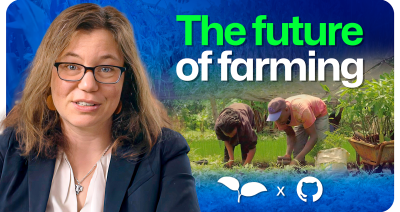(De)coding conventions
Navigating the ebb and flow of programming paradigms–from the shifts in the JavaScript ecosystem and TypeScript’s rise, to AI’s role in advancing accessibility, and strategies for encouraging non-code contributions–tune in to the latest episode of The ReadME Podcast for more.

Subscribe to The ReadME Podcast on Apple Podcasts, Spotify, or wherever you listen to podcasts.
“You can have programs that type check and still throw type errors, while programs that TypeScript finds fault with might not throw type errors. Although these situations are edge cases and relatively rare, they do occur. Generally, when confronted with such caveats, the typical response is, ‘Well, it’s sufficient for my use case.’ While this is a valid decision to make, it is important to bear in mind that this remains a potential disadvantage to consider.”
That’s a quote from prolific open source maintainer, Jordan Harband, on July’s episode of The ReadME Podcast. Jordan believes that adding type checking, like TypeScript, introduces complexity to your code base, placing additional demands on developers to comprehend and maintain the code. When errors are unclear or inaccurate, it can consume a significant amount of time and, crucially, mental energy to stop what you were doing, diagnose the issue, and then proceed.
Of course, TypeScript’s growth in popularity might beg to disagree.
The ReadME Podcast’s July episode examines the ebbing tides of programming paradigms and how the development community responds to these cycles. GitHub Senior Editor, Mike Melanson, joins the podcast to discuss his newly published featured story titled, “TypeScript and the dawn of gradual types,” outlining the evolution of the JavaScript ecosystem, the rise of TypeScript, and the shift toward gradual typing. Later, we hear from Aaron Gustafson, Principal Accessibility Innovation Strategist at Microsoft, as he discusses the potential for AI to revolutionize internet accessibility and highlights initiatives that are already in place to guide this progress.
We also hear from Kingsley Mkpandiok, Open Source Design Advocate and UX Designer, as he answers a user-submitted question on encouraging non-code contributions. Kingsley believes that inclusivity in the open source ecosystem means valuing all skills. No matter how small or unrelated your abilities may seem, they can still significantly contribute to improving a project.
Catch all these stories and more in this month’s episode of The ReadME Podcast.
| (De)coding conventions | The evolution of TypeScript and the future of coding conventions, AI’s role in improving accessibility, and practical advice on encouraging non-code contributions. |
| Bridging code and community | Navigating open source in a regulated environment, the crucial role of non-code contributions to open source success, and lessons from scaling projects like Kubernetes. |
| Kelsey Hightower—Present | In this special episode, Kelsey shares his origin story, insights on the future of Kubernetes, and advice on making complicated technology easier to understand. |
| The open/closed equilibrium | Striking a balance between openness and control in open source projects, preserving the integrity of community insights, and how humor can transform communities. |
Next month, we’ll be venturing outside the hype cycle to highlight a programming community that’s making the most of a vanguard technology. Make sure to subscribe to The ReadME Podcast on Apple Podcasts, Spotify, or your preferred podcast platform to stay up to date!
Tags:
Written by
Related posts

From first commits to big ships: Tune into our new open source podcast
Introducing the brand new GitHub Podcast: A show dedicated to the topics, trends, stories, and culture in and around the open source developer community on GitHub.

Scaling for impact: How GitHub Copilot supercharges smallholder farmers
Empowering 10 million farm families by 2030 to generate $1 billion in new revenue. How GitHub helps One Acre Fund’s mission — driving real impact across Africa.

We need a European Sovereign Tech Fund
Open source software is critical infrastructure, but it’s underfunded. With a new feasibility study, GitHub’s developer policy team is building a coalition of policymakers and industry to close the maintenance funding gap.